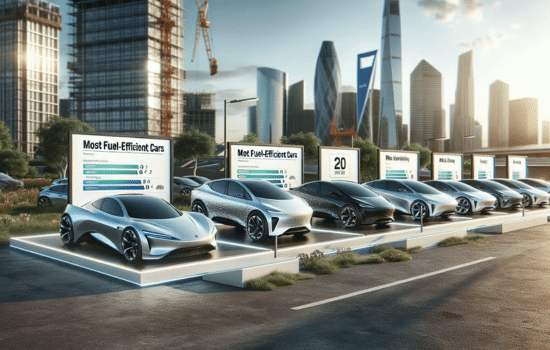Advertisements
In the world of motorsport, fuel efficiency has become a key factor for those looking to reduce costs and minimise their environmental impact.
With fuel prices constantly fluctuating and awareness of sustainability growing, choosing a fuel-efficient vehicle is not only an economical decision, but also a commitment to a greener future.
Advertisements
This phenomenon has driven manufacturers to innovate and develop models that combine performance, advanced technology and low fuel consumption.
In this comprehensive analysis, we will present the top ten cars that lead the market in terms of fuel efficiency.
Advertisements
These models not only stand out for their low consumption, but also for their performance and additional features that make them attractive to conscious consumers.
From hybrid powertrains to aerodynamic design innovations, each vehicle on this list offers a unique solution for those looking to maximize every drop of fuel.
Additionally, the technologies behind these efficiency champions will be explored, providing a deeper insight into how modern engineering is revolutionizing the automotive sector.
See also:
- The 10 most energy efficient supercars
- Dance and tone up with our app!
- Dive into faith with Christian music
- Top 10 Eco-Efficient Cars
- Master the accordion with our app
Internal combustion engines have evolved significantly, and electric and hybrid alternatives have gained ground, redefining what we mean by efficiency on the road.
The economic impact of opting for one of these vehicles will also be discussed, with detailed calculations on the potential savings over its lifetime.
This approach not only makes it easier to understand ROI, but also highlights how smart purchasing decisions can contribute to a more robust personal economy.
Finally, practical advice will be provided for potential buyers, helping them assess their needs and choose the vehicle that best suits their lifestyle.
With accurate and relevant information, this analysis promises to be an invaluable resource for those considering taking the step towards more efficient and sustainable driving.
The quest for fuel efficiency
As the automotive industry advances, fuel efficiency has become a priority for both manufacturers and consumers.
In a world where resources are finite and environmental awareness is on the rise, fuel-efficient cars are not only economically advantageous, but also contribute to reducing emissions and making the planet more sustainable.
This quest for efficiency is driven by technological innovations and government regulations that demand lower environmental impact.
Manufacturers have responded to this demand by developing vehicles that are not only more fuel efficient, but also offer improved performance and comfort.
The incorporation of smaller but more powerful engines, along with advanced aerodynamics and lightweight materials, are some of the strategies used to achieve these objectives.
At the same time, the rise of hybrid and electric vehicles has expanded the spectrum of options for fuel-conscious consumers.
This trend towards efficiency is not just about reducing fuel costs, but about a broader commitment to the environment and innovation.
Fuel-efficient cars represent a significant advance in automotive engineering, and their popularity is on the rise as more drivers look for sustainable alternatives for their daily transportation.
Below, we'll explore some of the leading models in this category, highlighting their features and contributions to a greener future.
Factors that determine fuel consumption
A vehicle's fuel consumption is determined by a combination of mechanical, technological and design factors.
One of the main elements is the engine, where its size, efficiency and type (whether internal combustion, hybrid or electric) play a crucial role.
Smaller, turbocharged engines have proven to be highly efficient, providing a balance between power and reduced fuel consumption.
Vehicle aerodynamics are also essential. A design that minimizes wind resistance can significantly improve fuel efficiency.
Cars with smoother lines and low profiles tend to cut through the air more efficiently, thus reducing the energy needed to maintain speed.
In addition, the weight of the vehicle is another determining factor; cars built with lightweight materials such as aluminum or advanced composites require less energy to move.
Transmission technology also impacts fuel economy. State-of-the-art automatic transmissions, such as dual-clutch and continuously variable transmissions (CVT), are designed to optimize engine revs and maximize efficiency.
Engine management systems that adjust fuel injection and ignition timing also contribute to more efficient fuel use.
Finally, driver behavior and vehicle maintenance are human factors that should not be underestimated.
Aggressive driving, such as hard acceleration and sudden braking, increases fuel consumption. Regular maintenance, including engine checks, oil changes, and tire maintenance, ensures that the vehicle operates at its optimal level of efficiency.
Leading models in fuel efficiency
Exploring leading fuel-efficient models is essential to understanding how the automotive industry is addressing sustainability and economy challenges.
One of the most notable cars in this category is the Toyota Prius. This hybrid vehicle has been a pioneer in the industry since its launch, combining a gasoline engine with an electric motor to maximize fuel efficiency.
Its aerodynamic design and advanced technology make it a popular choice among environmentally conscious drivers.
Another model worth mentioning is the Honda Insight, which offers an efficient driving experience without compromising on comfort.
With a hybrid engine that effectively combines electricity and gasoline, the Insight positions itself as a strong competitor in the fuel-efficient car market.
Its lightweight design and smooth driving characteristics contribute to its impressive fuel efficiency.
The Hyundai Ioniq is another contender that has captured the attention of consumers. Available in hybrid, plug-in hybrid and all-electric versions, the Ioniq offers flexibility that few models can match.
Its modern design and innovative technology ensure minimum fuel consumption, while providing a dynamic driving experience.
These models represent only a fraction of the available vehicles that lead in fuel efficiency.
As more manufacturers adopt advanced technologies and sustainable design approaches, consumers have more options than ever to reduce their carbon footprint and save on fuel costs.
Continued innovation in this field promises a future where energy efficiency and sustainability become the norm, rather than the exception.
Environmental and economic impact of efficient cars
The environmental and economic impact of fuel-efficient cars is significant and multifaceted.
From an environmental perspective, these vehicles contribute to the reduction of greenhouse gas emissions, a key factor in the fight against climate change.
By reducing the amount of fuel burned, fewer harmful gases such as carbon dioxide and nitrogen oxides are emitted, improving air quality and reducing urban smog.
Economically, the benefits are equally notable. Fuel-efficient vehicles allow drivers to save money on gasoline costs, which is especially important given rising global oil prices.
In addition, many governments offer tax incentives and subsidies for the purchase of hybrid and electric cars, which can represent additional savings for consumers.
Lower fuel consumption also means less wear and tear on the engine and other vehicle components, potentially reducing long-term maintenance costs.
Cars designed to be efficient are often equipped with advanced technologies that monitor performance and alert the driver to potential problems, preventing costly repairs.
At the macroeconomic level, a more efficient vehicle fleet can help countries reduce their dependence on imported oil, improving energy security and stabilising national economies.
This transition to more efficient and sustainable vehicles is an integral part of the global effort to mitigate the impact of transport on climate change and move towards a safer and cleaner energy future.
Technological innovations in fuel efficiency
Technological innovations are revolutionizing fuel efficiency in modern vehicles, allowing manufacturers to surpass previously unattainable limits.
One of the most significant innovations has been the development of hybrid and electric propulsion systems. These systems combine electric energy with fossil fuels to optimize consumption and reduce emissions.
Another key innovation is the use of advanced composite materials and lightweight alloys in vehicle construction.
By reducing the overall weight of the vehicle, less energy is required to move it, thus improving fuel efficiency.
This construction technique also improves the car's safety and performance without compromising its energy efficiency.
Turbocharged engine technology is another area of advancement. Smaller engines fitted with turbochargers can deliver the same power as larger engines, but with significantly lower fuel consumption. This is achieved by forcing more air into the engine, improving its efficiency and performance.
Newer engine management systems and transmissions, such as continuously variable transmissions (CVT), have also improved vehicle efficiency.
These technologies automatically adjust engine and transmission performance to maximize fuel economy under different driving conditions.
The future of fuel efficiency is also being shaped by artificial intelligence and autonomous driving systems.
These technologies promise to further optimize fuel consumption by reducing human inefficiencies such as aggressive driving or navigation errors.
As these technologies continue to develop, vehicles are expected to become increasingly efficient, sustainable and affordable for consumers.

Conclusion
In conclusion, the quest for fuel efficiency has transformed the automotive landscape, reflecting a growing commitment to sustainability and economic savings.
Fuel-efficient models such as the Toyota Prius, Honda Insight and Hyundai Ioniq exemplify how innovation and technology can converge to deliver vehicles that not only reduce environmental impact, but are also economically advantageous for consumers.
By incorporating smaller, turbocharged engines, aerodynamic design and lightweight materials, these cars set new standards for efficiency.
Furthermore, the adoption of hybrid and electric propulsion systems marks a milestone in the industry, allowing an optimal combination of electric power and fossil fuels.
These advances not only improve fuel efficiency, but also contribute to the reduction of greenhouse gas emissions, which are crucial in the fight against climate change.
With government incentives and growing consumer interest, the future of fuel-efficient vehicles is bright.
Ultimately, the positive impact of these cars extends beyond individual advantages, positively affecting national economies by reducing dependence on imported oil.
As technologies continue to evolve, we can look forward to a future where energy efficiency and sustainability are established norms, ensuring cleaner and more conscious transportation.




